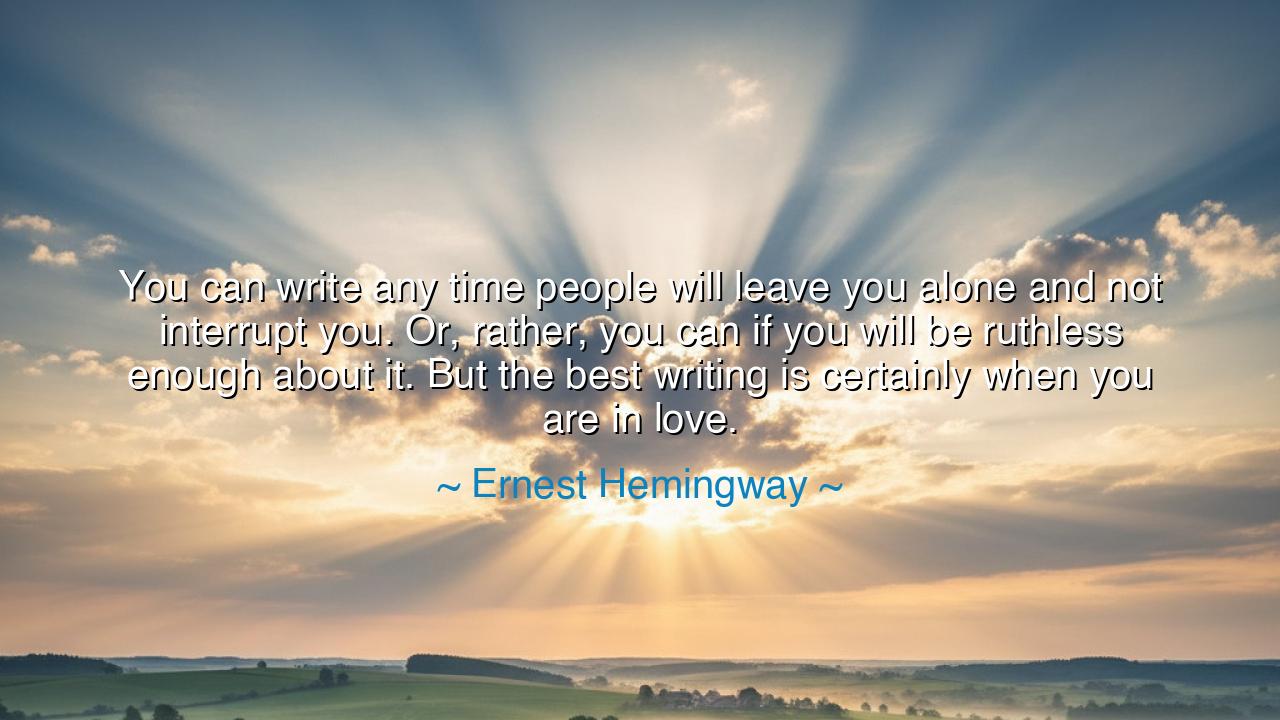
You can write any time people will leave you alone and not
You can write any time people will leave you alone and not interrupt you. Or, rather, you can if you will be ruthless enough about it. But the best writing is certainly when you are in love.






In the immortal and piercing words of Ernest Hemingway, the craftsman of truth and the poet of the human will, we hear this reflection on art and the heart: “You can write any time people will leave you alone and not interrupt you. Or, rather, you can if you will be ruthless enough about it. But the best writing is certainly when you are in love.” In these few lines, Hemingway unveils two eternal truths about creation: that great work demands solitude and discipline, and yet, paradoxically, that the soul’s greatest inspiration comes not from detachment but from love—that mysterious force which stirs the depths of being and sets fire to all words, all deeds, all dreams.
Hemingway’s words are rooted in his own life of passion and struggle. He was a man who sought both isolation and intensity—a writer who would shut himself away to labor over each sentence, yet whose heart was constantly set aflame by the world and those he loved. From the cafés of Paris to the battlefields of Spain, he carried within him a restless hunger: to live deeply, and to translate that life into words. His quote captures this duality—the ruthless discipline of the artist, and the tender power of emotion that gives art its soul. For to write well, he suggests, one must both control and surrender; one must guard one’s time fiercely, yet open one’s heart completely.
When Hemingway says, “You can write any time people will leave you alone,” he speaks to the sacred need for solitude—the stillness in which thought ripens into truth. The artist must carve out a space apart from the noise of the world, a fortress of quiet where imagination can breathe. To create anything of worth, one must be willing to say “no” to distraction, to guard that solitude with almost ruthless devotion. Yet this solitude is not loneliness—it is the discipline of one who values the whisper of inspiration above the clamor of the crowd. For in that silence, the writer listens not only to his mind, but to the beating of his own heart.
And yet Hemingway does not stop there. He adds, “But the best writing is certainly when you are in love.” Here lies the paradox that crowns his wisdom: that even in solitude, the artist must not be cold. The flame of love—whether for a person, a place, a memory, or for life itself—is what gives warmth to the words. Without love, writing becomes mere craft; with love, it becomes creation. When one is in love, the senses awaken, the heart expands, and even the smallest details of existence shine with meaning. The beloved becomes a mirror in which the writer sees beauty everywhere. It is this state of heightened awareness, of reverence for life, that transforms mere sentences into art.
This truth is not Hemingway’s alone—it is echoed through the ages. Think of Dante Alighieri, who wrote The Divine Comedy out of his undying love for Beatrice, a woman he barely knew yet






AAdministratorAdministrator
Welcome, honored guests. Please leave a comment, we will respond soon